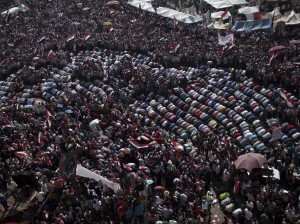
Egyptian protesters pray during a rally against Egypt’s Islamist President Mohammed Morsi in Tahrir Square in Cairo, Sunday, June 30, 2013. Millions of opponents of Egypt’s Islamist president poured out onto the streets in Cairo and across much of the nation Sunday, launching an all-out push to force Mohammed Morsi from office on the first anniversary of his inauguration. AP PHOTO/MANU BRABO
CAIRO—Millions flooded the streets on Sunday determined to oust Islamist President Mohamed Morsi on the anniversary of his turbulent first year in power, in the biggest protests Egypt has seen since the 2011 revolt.
As chants of “Leave!” rang out around Cairo, the presidency insisted dialogue was the only way out of the crisis.
Despite the peaceful atmosphere of the day, as night fell, isolated acts of violence left two people dead.
“It is the biggest protest in Egypt’s history,” a military source told AFP on condition of anonymity, adding that “millions” of people were on the streets across the country.
One person was killed in the central province of Assiut when gunmen on a motorbike opened fire on protesters, a security official said.
Another person died and 40 others were injured when clashes broke out between supporters and opponents of Morsi in Beni Sueif province, south of Cairo.
Both incidents took place outside offices of the Freedom and Justice Party, the political arm of Morsi’s Muslim Brotherhood.
‘Thugs’ attack
Dozens of “thugs” also attacked the Brotherhood headquarters in Cairo with petrol bombs, birdshot and stones, Gehad al-Haddad, a spokesman for the Islamist movement said.
Morsi’s spokesman Ehab Fahmy, meanwhile, insisted on the need for a national dialogue.
“Dialogue is the only way through which we can reach an understanding… The presidency is open to a real and serious national dialogue,” Fahmy told a news conference.
The call fell on deaf ears as the main opposition coalition called for a campaign of civil disobedience and urged Egyptians to stay on the streets until Morsi stepped down.
The National Salvation Front urged “all the revolutionary forces and all citizens to maintain their peaceful (rallies) in all the squares and streets and villages and hamlets of the country, and not to deal with the Brotherhood government until the last of this dictatorial regime falls.”
Anti-Morsi protests were also held in the coastal city of Alexandria, the Nile Delta cities of Mansura, Menuf, Tanta and Mahalla, the canal cities of Suez and Port Said and in the president’s hometown of Zagazig.
In Cairo’s iconic Tahrir Square, protesters waved red cards and Egyptian flags as patriotic songs boomed from large speakers.
Echoes of 2011 revolt
“The people want the ouster of the regime,” the protesters chanted, echoing the signature slogan of the 2011 revolt that ousted Hosni Mubarak and brought Morsi to power.
“This is the second revolution and Tahrir is the symbol of the revolution,” said carpenter Ibrahim Hammouda, who came from the northern city of Damietta for the protest.
Morsi supporters have been holding counter-rallies for days to defend his legitimacy and have vowed to stay on the streets as well, raising fears of confrontations.
But Sunday’s anti-government protests eclipsed their gathering in Cairo’s Nasr City neighborhood, which the army estimated to number around 25,000 people.
Police and troops have deployed at key buildings nationwide, including the vital Suez Canal waterway, security officials said, and hospitals were put on high alert.
Banks and most offices closed on Sunday, a working day in Egypt.
The grassroots movement Tamarod—Arabic for rebellion—said it collected more than 22 million signatures to a petition demanding Morsi’s resignation and new elections.
The figure, which compares with the 13.2 million votes to 12.3 million by which Morsi won election last year, cannot be verified.
Posters urging people to join anti-Morsi protests were plastered on walls across Cairo and stuck on car windows, along with “June 30” graffiti.
Rival demonstrators clash
The week ahead of the showdown has seen eight people including an American killed, and scores more injured as rival demonstrators clashed.
Morsi, previously a senior Brotherhood leader, is Egypt’s first freely elected president, catapulted to power by the 2011 uprising that ended three decades of authoritarian Mubarak rule.
His opponents accuse him of betraying the revolution by concentrating power in Islamist hands and of sending the economy into free fall.
Morsi supporters say he inherited many problems from a corrupt regime, and that he should be allowed to complete his term which ends in 2016.
Any attempt to remove him from office is a coup against democracy, his supporters say while opponents insist calls for his resignation are aimed at restoring the 2011 revolution’s cornerstones of democracy, freedom and social justice.
“We will not allow a coup against the president,” senior Brotherhood leader Mohamed al-Beltagui said.
The army, which led a tumultuous transition after Mubarak’s ouster, has warned it will intervene if there is major unrest.
Since taking office, Morsi has battled with the judiciary, the media and the police. The economy has nosedived, investment dried up, inflation soared and the vital tourism sector been battered.
In a televised speech on Wednesday, Morsi warned the polarization threatened to “paralyze” Egypt as he tried to placate protesters with appeals for dialogue and promises of constitutional reform.—Jailan Zayan, Haitham El-Tabei